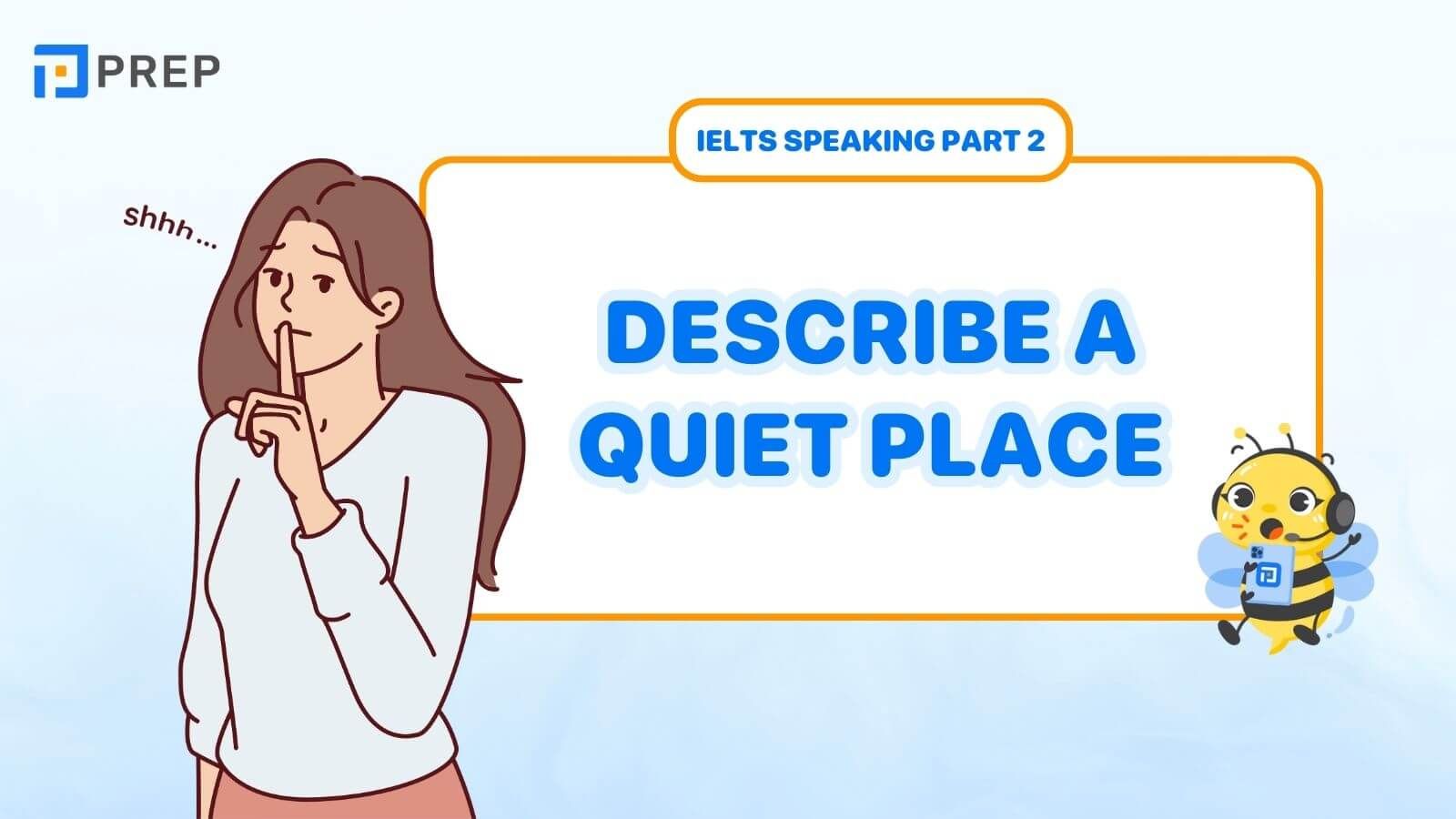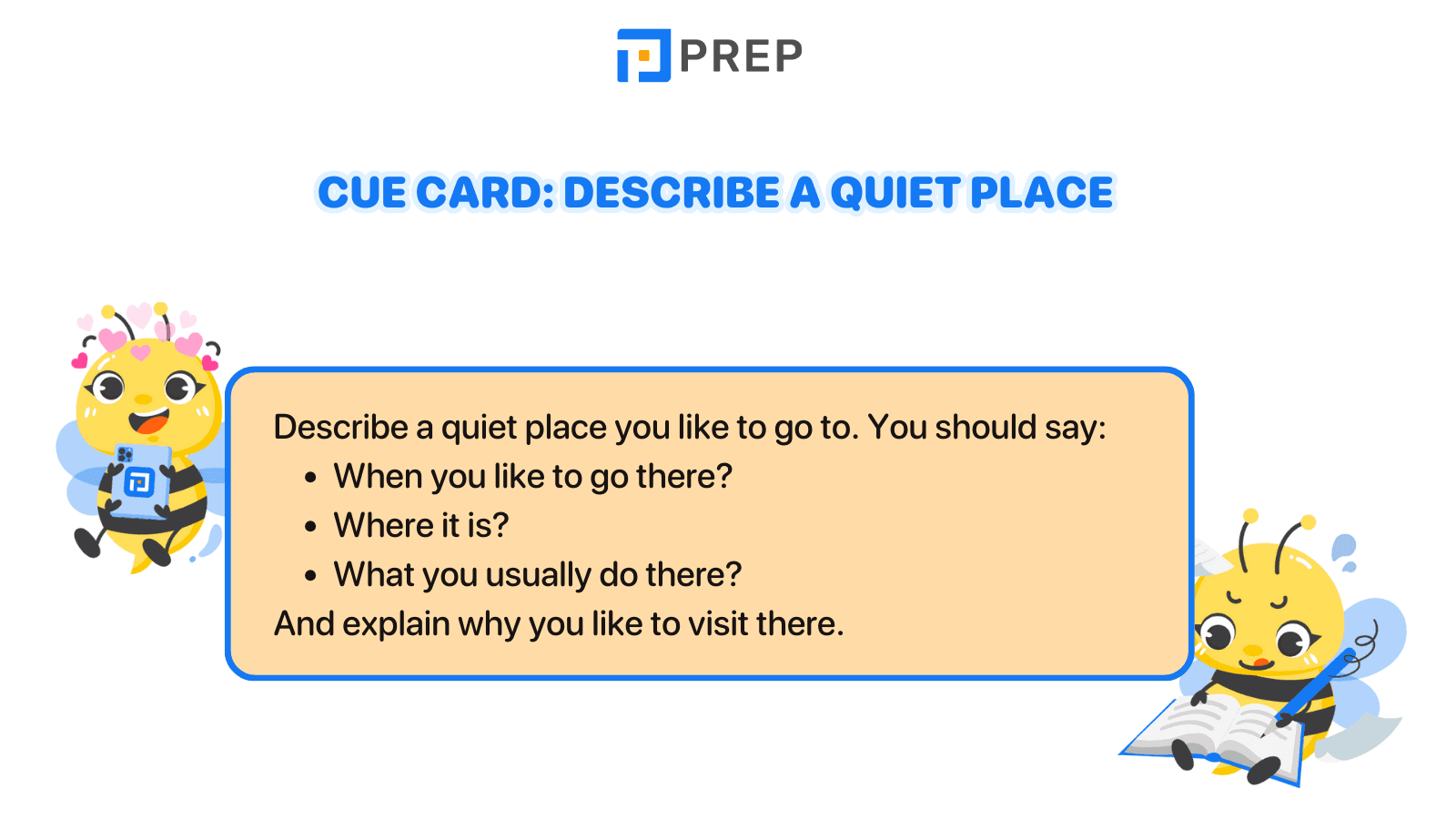Sample IELTS Speaking Part 2 topic: Describe a quiet place
The topic "Describe a quiet place" is not too challenging for IELTS Speaking Part 2 candidates. However, to handle the "Describe a quiet place" task, the easiest and most effective way is to stick closely to what the cue card topic provides. In addition, the candidate needs to provide the most specific and detailed information, and avoid speaking in generalities, but to ensure they don't go off track, the candidate needs to focus on describing the peacefulness of the place.
Read the article below to better understand how to develop the IELTS Speaking Part 2 task and 3 topics on "Describe a quiet place" in the real test at Preppies!

I. IELTS Speaking Part 2 question and answer: Describe a quiet place
1. Cue card: Describe a quiet place
Cue cards play a crucial role in the IELTS Speaking Part 2 task. During this section, candidates are asked to give a short speech on a particular topic for 2 minutes. To help structure and guide this response, test takers are provided with a cue card that outlines the key points they should cover. These cue cards are invaluable, as they give candidates a clear framework to follow and prevent them from going off-topic or rambling aimlessly. The information on the cue card acts as prompts to ensure the response includes all the necessary details and flows in a logical manner. Without this support, many test takers would struggle to coherently organize their thoughts and deliver a comprehensive monologue within the tight time constraint. Furthermore, the cue card allows candidates to prepare and practice their response ahead of time, which can significantly boost their confidence and fluency when it comes time to speak. Overall, cue cards are an essential tool that IELTS candidates should leverage to maximize their performance in the Speaking Part 2 task. By using the cue card effectively to structure their response, test takers can demonstrate their English proficiency to the best of their abilities.
Below is the cue card for the topic: Describe a quiet place you like to go to. You should say:
-
When you like to go there?
-
Where it is?
-
What you usually do there?
And explain why you like to visit there.

2. Outline: Part 2
2.1. Sample
-
The "Describe a quiet place" task requires candidates to describe a location that may be a popular tourist destination but to emphasize the peaceful aspect of the place. When answering the questions, the candidate should describe:
-
When did you visit this place?
-
Where is this place located?
-
What did you do there?
-
Explain why you liked this place.
-
-
The topic falls under the broader category of describing a building or a tourist destination. To handle the "Describe a quiet place" task, the easiest and most effective way is to stick closely to the cue provided in the task and provide the most specific and detailed information possible, and avoid speaking in generalities. But to ensure they don't go off track, the candidate needs to focus on describing the peacefulness of the place.
-
For the question on the location, this is the place the candidate wishes to visit to find tranquility. Suppose the candidate gets sidetracked describing a popular tourist destination like Da Nang or Hoi An without mentioning the peaceful element. In that case, they risk losing points on the Fluency and Coherence criterion.
-
For the question on when they visited, the candidate can simply choose any time of the year (a particular season or period) or a special occasion, and think about who they went with (family, friends, etc.) or even going alone.
-
For the third question on what they did there, the candidate can describe activities that anyone visiting the place would typically do.
-
The final question, explaining why they liked the place, is often considered the most important part of the "Describe a quiet place" task. Candidates can devote a significant portion of their response to conveying their impressions of the location or experiences they had there. Candidates can also weave their personal impressions into each of the responses to the previous questions, as long as they achieve the main objective of using vocabulary to describe the emotions and perceptions about a particular location.
2.2. One-minute note-taking
|
Where |
|
|
When |
|
|
What do you do there |
|
|
Why |
|
3. IELTS Speaking Task 2 samples: Describe a quiet place
Let's review the sample IELTS Speaking Part 2 answer on the topic "Describe a quiet place" below to effectively prepare for the exam at home and achieve a high band score in the actual Speaking test.

Let's take a look at the IELTS Part 2 Speaking examples - "Describe a quiet place":
Today I'd like to tell you about Hoi An, where I went to grieve my mother's passing. I got to say that it's the best place to feel great comfort in the peace it provides where I can listen to my inner voice.
Exactly five months, I badly needed a place to escape and clear my head after months of helping my mother fight cancer, and we lost. Hoi An was the closest place where I could simply hop on the plane, and two hours later, I could be there. So I simply packed my back, booked a ticket, and left Hanoi with a heavy heart.
Hoi An greeted me with hospitable people and tranquility. I was lucky to go there during off-peak season, so it was less crowded than the last time I went there with friends. It was just what I needed. I aimlessly strolled around the ancient streets and cycled through the countryside alone. I experienced rural Vietnamese living firsthand and saw a lot of lush vegetable gardens, and vast duck ponds.
After Covid, the place was deserted. I talked to local farmers about the pandemic, its effects, and other things in life too. I slowly realized maybe all suffering would eventually end. My mother's now free from pain and any hardship that we experienced.
I didn't know how but two weeks in Hoi An had this healing power that I didn't know existed. Maybe because the slow pace of life there helps me think clearly, talking to local farmers about life generally, or being close to nature eases my sorrow. So if anyone asks me for a place to clear one's head, Hoi An is one of the options I would strongly recommend.
Some vocabulary words that can score points used in the quiet place IELTS Speaking Part 2 sample:
-
grieve (verb): to feel deep sorrow
-
Escape (verb): to get away from
-
Clear one's head (phrase): to unclutter the mind
-
hop on (verb): to jump onto
-
Heavy heart (noun): a burdened heart
-
Greet (verb): to welcome
-
Tranquility (noun): calmness, peacefulness
-
Off-peak season (noun): the low tourist season
-
Aimlessly (adv): without purpose
-
Stroll (verb): to walk in a leisurely way
-
Lush (adj): rich and abundant
-
Deserted (adj): empty, without people
-
Suffering (noun): the experience of pain
-
Healing power (noun): the ability to make better
-
Ease (verb): to reduce
-
Sorrow (noun): a feeling of deep sadness
Note: This sample response can also be used for other prompts such as: Describe a quiet place you like to go to, Describe a quiet place you like to go, Describe a quiet place you like to spend your time in, Describe a quiet place you like, etc.
II. Sample IELTS Speaking Part 3: Quiet places
Continuing with Speaking Part 2, let's take a look at the sample IELTS Speaking Part 3 answer on the topic of Quiet places with prepedu.com!
1. Are there any other quiet places?
The ultimate destination to find peace, quiet, and inspiration is being close to nature. It can be in the jungle, by the beach, to name a few. It does stop there. Parks, libraries, gardens, and churches are all popular places for those seeking solitude.
-
Solitude (noun): a quiet, remote, or unfrequented place.
2. Is it hard to find quiet places in cities?
I don't think it's that difficult when you look close enough. You can pretty much find tranquility everywhere you go. The majority of people would think that since the cities are full of crowds so it’s loud and noisy, but I beg to differ. In early morning, it's quite peaceful when a person strolls in the parks or go to temples. The key is to find a perfect time slot to visit such places. And yet, look no further, home is the place anyone can go to to find silent at some point.
-
Tranquility (noun): the state of being calm, peaceful, and untroubled.
3. Why do people like to spend time in quiet places?
Quietness helps people find peace of mind and boost concentration. These should lead to better job performance, and significantly reduce stress, all of which have positive effects on productivity. People can actually reflect and analyse situations in quiet areas. Hardly can you think clearly in noisy places.
-
peace of mind (phrase): a state of mental and emotional calmness
-
productivity (noun): the state or quality of being productive
-
reflect (verb): to think deeply about something
-
analyse (verb): to examine methodically and in detail
III. Conclusion
This article has provided a sample IELTS Speaking Part 2 + 3 on the topic and a podcast to help you practice listening and speaking. If you are preparing for the IELTS exam but don't have a study plan, join the IELTS preparation course at Prep!

Hi I'm Chloe, and I am currently serving as an Product Content Administrator at Prep Education. With over five years of experience in independent online IELTS study and exam preparation, I am confident in my ability to support learners in achieving their highest possible scores.
Comment
Premium content
View allPersonalized roadmap
Most read












